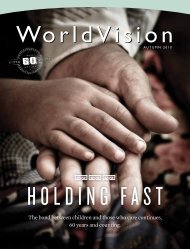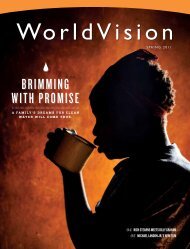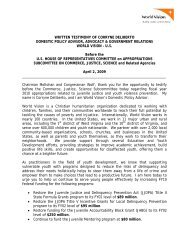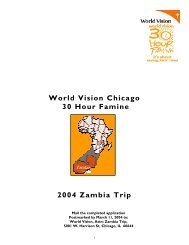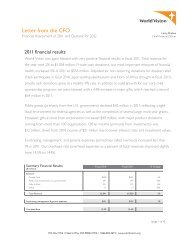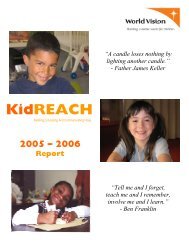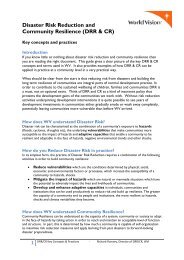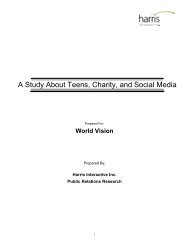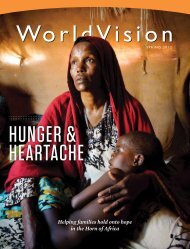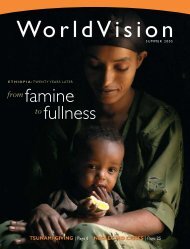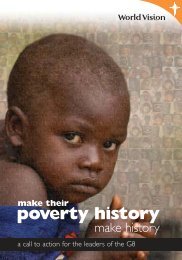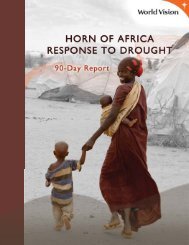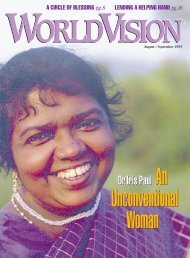World Vision ODAY
World Vision ODAY
World Vision ODAY
Create successful ePaper yourself
Turn your PDF publications into a flip-book with our unique Google optimized e-Paper software.
connect theory with practice. His solution:<br />
“I decided to look for the poorest of the<br />
poor and just be with them.” He asked the<br />
Sisters of Charity, Mother Theresa’s order,<br />
to help him find a needy place. They sent<br />
him to Smokey Mountain.<br />
Since 1954, Manila’s government had<br />
been dumping garbage on this former<br />
fishing area. As the dump grew, so did the<br />
number of scavengers—people broken by<br />
the hardships of the city who had no choice<br />
but to live among refuse and rats. Politicians,<br />
journalists, and aid workers came to gawk<br />
at the dumpsite, quickly fleeing the stench<br />
and crushing poverty. Fr. Ben stayed.<br />
“I was not trained for breathing in<br />
smoke and particles 24 hours a day, or eating<br />
inside mosquito nets because otherwise the<br />
food would be full of flies,” he says. “Nobody<br />
can train you for that.” He developed chronic<br />
bronchitis and allergies.<br />
Fr. Ben led the celebration of the<br />
Eucharist every Sunday in a run-down<br />
chapel that was later repaired to become the<br />
Church of the Risen Christ. “[The Mass] was<br />
the answer to the people’s prayers,” Fr. Ben<br />
says. “It gave them a sense of identity.” He<br />
walked around the shantytown and talked<br />
to people, gradually earning their trust.<br />
Fr. Ben’s vision for the community<br />
crystallized in 1983. The government,<br />
eyeing the financial opportunities of a revitalized<br />
waterfront, forcibly resettled the<br />
Smokey Mountain squatters to another<br />
area. “The people came back because there<br />
were no jobs,” Fr. Ben recalls. “They were<br />
starving to death.” He set up a tarpaulin<br />
for a temporary chapel, and the work<br />
began in earnest. Starting with the natural<br />
leaders, he began training people to form<br />
“basic Christian communities”— families<br />
grouped into cells with elected leaders<br />
representing their interests on various<br />
problem-solving committees, including<br />
10 <strong>World</strong> <strong>Vision</strong> T<strong>ODAY</strong><br />
livelihood, health, education, culture,<br />
spirituality, sport, and housing.<br />
Some community factions opposed the<br />
work. Fr. Ben received death threats. Once,<br />
a grenade was hurled onto the roof of his<br />
living quarters. It didn’t explode, nor did it<br />
deter him. He dismisses the incident as a<br />
nuisance “on equal terms with the flies.”<br />
His parents remember Ben’s perseverance:<br />
“I cannot run away from problems,” he<br />
told them.<br />
Smokey Mountain changed Fr. Ben. “I<br />
learned that God is speaking through the<br />
poor,” he says. “We should not think that only<br />
theologians understand the Bible. We have not<br />
listened to the poor. Just because they are<br />
unlettered does not mean that the truths of<br />
the Bible cannot be revealed to them.”<br />
Fr. Ben discovered during his two<br />
decades of urban ministry: “You should<br />
not come to the poor to save them, but<br />
to save yourself.”<br />
Fr. Ben implemented Bible sharing, in<br />
which community members read and discuss<br />
Scripture, empowering them to take a<br />
more active role in their faith without cues<br />
from clergy—a break with tradition in this<br />
predominantly Catholic country. “Even in<br />
our absence, people can talk about problems<br />
and settle issues,” says Fr. Jerome Marquez,<br />
who joined the Smokey Mountain staff in<br />
1995. “It makes the Bible the key to community<br />
organizing, sustenance, and growth.”<br />
As funding came in from the Philippine<br />
and U.S. governments, private donors, and<br />
relief agencies (<strong>World</strong> <strong>Vision</strong> supported<br />
leadership training), the community<br />
launched education programs and built a<br />
water system, a multi-purpose center, and<br />
paved walkways between people’s homes<br />
and the dump. Such changes had great<br />
impact on residents such as Christine<br />
Calisterio, who used to be shunned at the<br />
market because she smelled after trudging<br />
through muddy garbage. Families also<br />
moved from their squatter shacks into<br />
temporary housing, and soon will live in<br />
attractive permanent apartments. “I only<br />
started to believe in miracles when I came<br />
here,” says Fr. Jerome.<br />
MISSIONARIES TO THE ASPHALT JUNGLE<br />
The Society of the Divine Word seminary<br />
in Tagaytay, a three-hour drive from<br />
Manila, offers a glimpse into the other side of<br />
Fr. Ben’s life—contemplation, regeneration.<br />
The quiet seminary, surrounded by lush<br />
banana and coffee plants and colorful<br />
bougainvillea, provides the perfect setting.<br />
Fr. Ben teaches here two days a week, preparing<br />
young seminarians for urban ministry.<br />
“You have to read and keep up with theorists,<br />
otherwise you run out of ideas,” he explains.<br />
Part of Fr. Ben’s effectiveness in the<br />
classroom is that he lives what he teaches,<br />
says Fr. Jerome, a former student. “[The<br />
work] becomes very concrete when you see<br />
it in action.”<br />
“A new humanity is being born in the<br />
city, and that’s why missionaries should go<br />
there,” insists Fr. Ben. “Our romanticism<br />
tells us we should go to places like New<br />
Guinea. But the decisions influencing the<br />
lives of hundreds of millions are not made in<br />
the villages, but in the asphalt jungle.”<br />
Recently he presented a multi-media<br />
symposium on “The Church in the City,”<br />
introducing seminarians to global urbanization<br />
trends and the complex needs of the<br />
urban poor, ending with a challenge to the<br />
church to respond. The information overwhelmed<br />
many of the young men from<br />
rural regions. But in the open forum, one<br />
student commented, “Hope for the city is in<br />
our hands. We are the church. But before<br />
we can change the world, we must change<br />
ourselves.”<br />
Such is the task of those who will follow in<br />
Fr. Ben’s footsteps. At 51, he is ready to leave<br />
Smokey Mountain in the capable hands of<br />
community leaders. At the year’s end he will<br />
travel to the United States to set up an urban<br />
ministry training program with missiologist<br />
Ray Bakke. There are, after all, many Smokey<br />
Mountains in the world needing the “new<br />
heavens and new earth” promises of Isaiah 65.<br />
“What we have reaped here is all<br />
because a man had a vision,” says Fr.<br />
Jerome. “It’s like Jesus’ vision for everybody—the<br />
kingdom of God.” ■<br />
➤<br />
End of an era: Despite his popularity in<br />
Smokey Mountain, Fr. Ben worked<br />
himself out of his job by equipping the people<br />
to continue the community’s development.<br />
“They know what should be done,” he<br />
says. “They know hundreds of things.”<br />
<strong>World</strong> <strong>Vision</strong> T<strong>ODAY</strong> 11<br />
SANJAY SOJWAL / WORLD VISION



